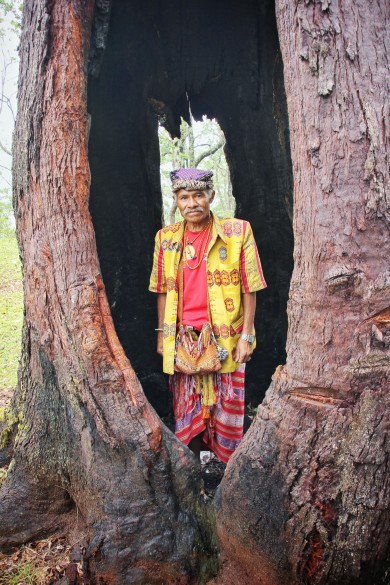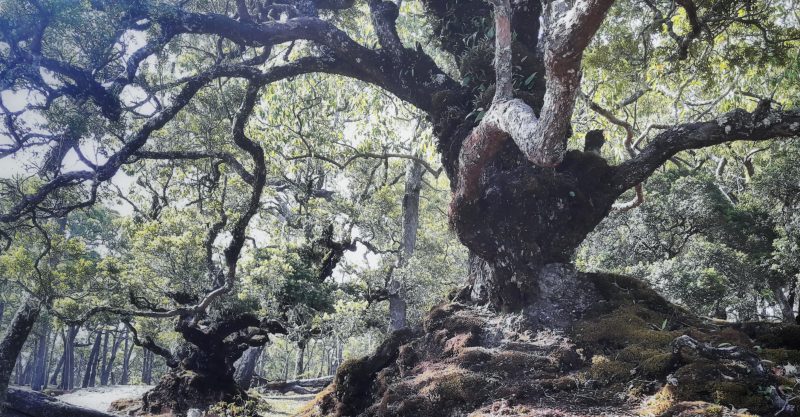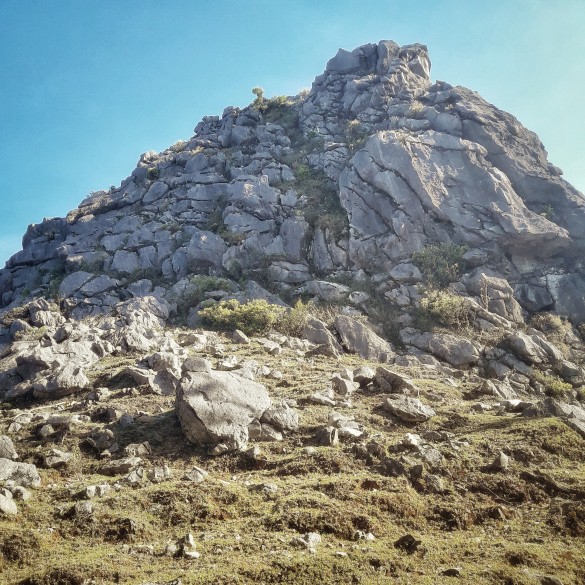“Timor’s very own Garden of Eden,” Grace Susetyo recalls a description someone once told her of Mount Mutis’s bonsai forest. Flaunting tiny leaves on curling branches, dressed with layers of green and white moss over the red earth, a walk through the bonsai forest is like watching a frozen frame of nature’s delicate eternal ballet.
The first time I saw “Bapatua” Matheos Anin was on a television screen. The 77-year-old Fatumnasi-based guardian of Mount Mutis was performing a prayer to the ancestral spirits to bless a family’s journey through Mutis’s sacred landscapes. Anin is both a Halaika priest and a devout Protestant. Halaika is the traditional faith of Central Timor’s Dawan people, based on the worship of the heavenly father Uis Neno and mother earth Uis Pah, as well as devotion to the spirits of nature and the ancestors.
“Long before Dutch missionaries introduced us to Christianity, our ancestors have known and worshipped the God above all creation,” he explained. “Continuing with our ritual prayers is not a matter of reverting to our ‘pagan ways,’ but a matter of guarding our ancestral heritage. We go to church, but continue acknowledging the ancestors whose blood runs in us, taking care of the earth that gives us life.”
In person, the Bapatua is just as lively as he’s been on screen, dressed in the finest outfit of vibrant-coloured tenun lotis, a traditional headdress, and layers of multi stone necklaces. The first time we met in 2013, though, Anin refrained from showing me the prayer sites, due to our introduction coming from my churchgoing aunt who ministers doa pelepasan to him –Christian prayers for breaking ungodly spiritual bondage. At a time when I was just getting to know Timorese culture through rose-coloured glasses, this unromantic revelation led us to an interesting conversation on why Anin would give up any powers vested in him through ancestral bondage in exchange for “freedom in Christ.”
I visited Anin once again in October 2016, this time as a regular guest at Lopo Mutis, Anin’s homestay in a cluster of ume kbubu – round, unfloored traditional houses made of alang-alang grass. The Bapatua’s granddaughter’s wedding was coming up, so they extended the invitation to me, kebaya loan included. The Bapatua and his wife did not sleep that weekend, entertaining the flood of relatives visiting from far away. In between the church service, music making, festive meals and dancing, Anin made the time for an interview and arranged a guide for my ascent.
The main difference between an ascent to Mutis and say, Rinjani or Tambora, is that places of spiritual significance are still easily recognisable and esteemed as such.
One of such landmarks is the batu berhala underneath Benteng Oenino – a menhir on a rock altar where Dawan farmers perform ritual prayers for rain or sunshine. Benteng Oenino is a megalithic pyramid-like formation on a hilltop which traditionally serves as a watchtower and fortress.
Legend has it that Benteng Oenino used to be guarded by two female warriors, Bitasi Atuni and Binau Atuni. The androgynous women, believed to have lived sometime before the 18th century Dutch colonial era, held vigils during the civil war, armed by a traditional rifle known as senapan tumbuk. Having won war after war, Bitasi Atuni and Binau Atuni were eventually defeated by obscure male warriors coming from “the direction of the sunset.” Being discovered as female, Bitasi Atuni and Binau Atuni were then kidnapped, and their heirloom possessions looted as war plunder.
Another sacred place encountered in this hike is the iconic bonsai forest. The red-and-white flowering trees which Anin christened as bonsai alam (nature’s bonsai), are in fact life-sized centuries-old endemic eucalyptus trees that grow diagonally in curls. Locally known in Dawan language as akuna, the bonsai alam is a traditionally protected species only found on Mount Mutis, especially near the Fatumnasi entrance.

Another endemic eucalyptus locally known as ampupu is also found throughout Timor and parts of tropical Australia. The largest one in Mutis grows to a diameter of ten metres, and the top looks out panoramically to West Timor’s capital Kupang. Ampupu makes good construction wood for houses and bridges, as well as a good place for bees to make beehives. Ampupu wild honey is dark, rich, and among the sweetest, harvested seasonally through strict customary prayer rituals.
Those who harvest ampupu honey before the ritual season, or destroy the traditionally protected akuna tree, are traditionally subject to life-threatening customary sanctions. A “light” sanction may include being made to eat a live beehive or to collect a coin at the bottom of a boiling kettle with bare hands. A “severe” sanction may include being buried alive up to one’s neck until wild animals, birds and insects consume the buried person. These punishments make a point that nature is to be respected, and that the destruction of nature brings death and suffering to neglectful or malicious humans.
“These customary sanctions have currently been toned down because people are converting to Christianity,” said Anin. “Indonesia has Perdes (Village Regulations) to back up customary law, but customs must adjust to the times. Today, we fear [being accused of violating] human rights. So these days, we reduce the customary sanction to a costly sacrifice of livestock to feed people in a feast.”
“The sins of my ancestors are my sins too,” the Bapatua continued. “That is why I reach out for doa pelepasan – so that I am forgiven of the sins of my ancestors.”
In an era when Indonesian media is dominated by stories of how religion has been used as the elite’s political mind-control tool over the urban masses, I find it a breath of fresh air to see how Christianity still represents a promise of freedom and progress for the guardians of ancient cultures in the remote corners of Timor, as well as many places in Indonesia throughout my travels.
From a green hilltop outlooking horses grazing on meadows to the south, and the blue mountains of Central Timor meeting the roaring Savu Sea to the north, I stood upon the rocks under which unnamed Dutch missionaries once laid their bones to rest. A group of local Timorese men greeted me and my guide, descending after a night’s sacrificial vigil prayers for Uis Pah’s blessing for the new planting season. At the summit, a small akuna tree dances in the wind with its fiery red and frosty white blossoms over remnants of the ritual: sirih-pinang and chicken feathers stuck with blood on the prayer rock.
To book Lopo Mutis, Bapatua Anin is contactable on +62 852 3989 0563. The Bapatua speaks basic English.
Fast Facts
Country: Indonesia
Province: Nusa Tenggara Timur (NTT)
Land area: 12,000 hectares (Cagar Alam Gunung Mutis)
Largest city: Soe (TTS Regency)
Population: 6,793 (2011 estimate of Fatumnasi district)
How to get there: Flights into international airport at Kupang
Car rental to Fatumnasi via Soe.
Alternatively, ojek and truck rides to Fatumnasi available from Soe.
What to bring: Camera, hat, sunscreen, insect repellent, hiking shoes, day pack.
Flashlight, extra batteries, power bank – electricity supply is unstable.
Bottled water – boiled potable water available at Lopo Mutis, but overall water supply is relatively scarce.
Groceries (optional) – meals of rice, instant noodles, eggs, and vegetables are provided. But gifts of staples, meat, and other ingredients would make nicer meals for everybody.
Cash for transactions – draw cash in Soe or Kupang, no ATMs in Fatumnasi.
Anin does not charge for stays at Lopo Mutis, but be generous with your donations and consider buying the local women’s textiles. The Bapatua also appreciates gifts of sirih-pinang and sopi (a locally brewed alcoholic drink.)





